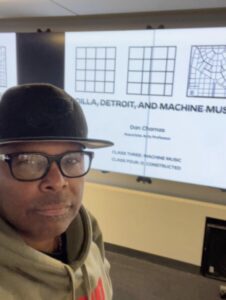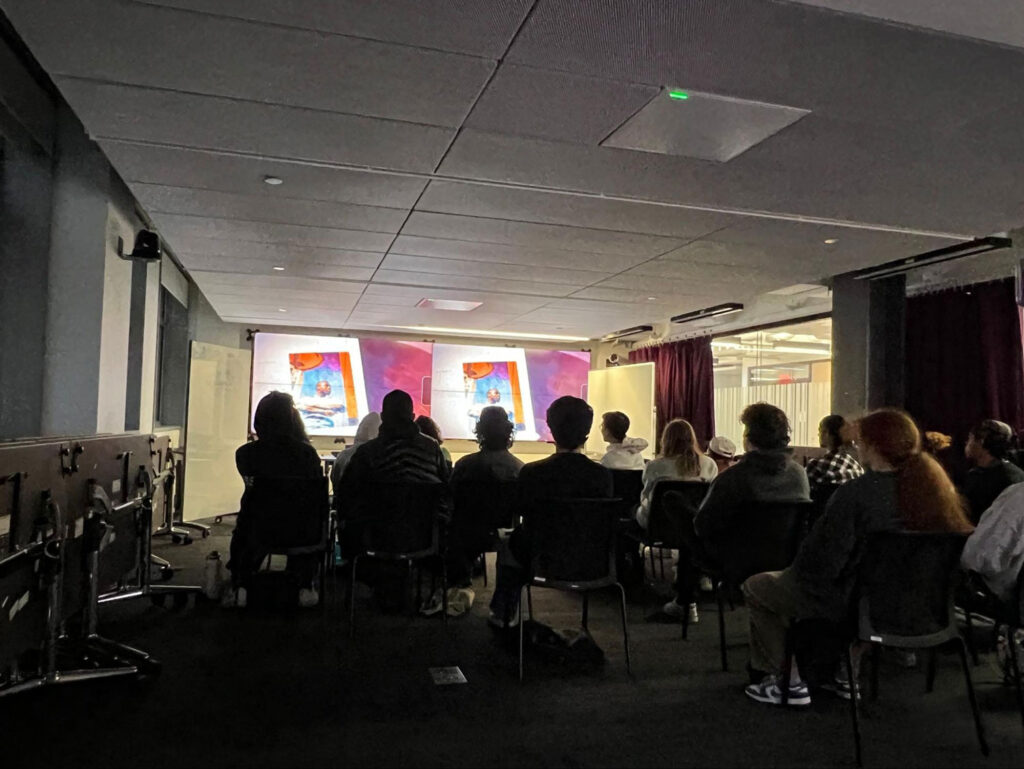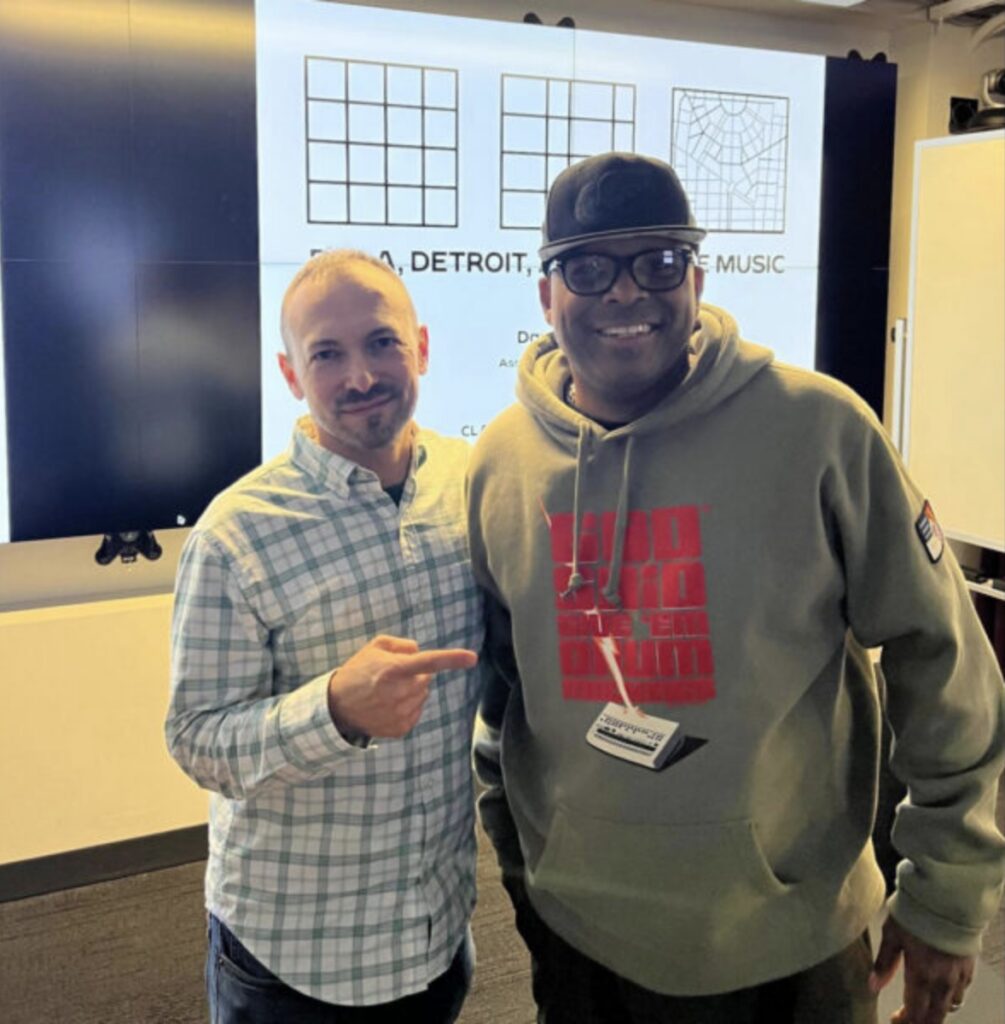 Dan Charnas invited David Grandison Jr. to screen a film he produced called “God Said Give ‘Em Drum Machines” for his students at The Clive Davis Institute. The course the screening was associated with is called “Dilla Detroit and Machine Music” that was created by Professor Dan Charnas. The students he spoke to were a interdisciplinary group of both aspiring musicians and students studying the business side of the music industry.
Dan Charnas invited David Grandison Jr. to screen a film he produced called “God Said Give ‘Em Drum Machines” for his students at The Clive Davis Institute. The course the screening was associated with is called “Dilla Detroit and Machine Music” that was created by Professor Dan Charnas. The students he spoke to were a interdisciplinary group of both aspiring musicians and students studying the business side of the music industry.
The students enjoyed the film and engaged with David and Dan in a powerful discussion on Detroit’s unique electronic music culture after the screening. In this Q&A discussion, we drew parallels between factors that influenced the development of hip-hop and Techno. One important parallel was that both art forms were created by Detroit teens who embraced drum machine and synthesizer programming. Both Techno’s creators and legendary hip hop artists like Dilla’s mastered drum machine programming in their teens. We also discussed how robots took the jobs of the parents of Detroit teens causing Detroit’s economic upheaval while teens embraced robotic-sounding music and taught themselves how to program drum machines and sequencers seemingly to avoid the same kind of robotic replacement. In our discussion, we discussed parallels between these art forms that both employed synthesizers, drum machines, and digital tools like the Roland TR808 and other drum machines in similar groundbreaking ways. We also discussed the teen party clubs and DJ crews that fed the thriving dance-music-obsessed party scene in Detroit. The students shared numerous insights about Detroit Techno, Hip-hop and electronic music that they learned from the film. As in most screenings, more than half of the students in the screening did not know that Techno’s origins can be traced to teens in Detroit in the 80’s before they saw the film.

His film speaks to numerous factors that influenced Dilla’s unique style of hip hop, from radio DJs like “The Electrifying Mojo” who introduced the first techno tracks to Detroit in the 80s DJs like The Wizard (Jeff Mills), who mashed up Techno tracks and pitched up hip-hop and later, into the 90s, by DJ’s like Derrick May who’s afterschool “MayDay Mix” and weekend late-night party mix shows like the “TP in The DMZ” mix show by Terrence Parker. Dilla was influenced to utilize and master drum machines sequencers and other types of electronic instruments by this exposure among other factors as teen. In Detroit collaborations go deep and many of the artists in J Dilla’s circle are known for their work in House, Techno and Hip-hop; for example; Amp Fiddler, who mentored him and taught him to program the MPC 3000 played with George Clinton in Parliament. J Dilla recruited Dez Andrez (DJ Dez) the DJ for his group Slum Village.Dez is the son of Humberto ‘Nengue’ Hernandez, a world renown percussionist. Dez builds strong bridges between house, and Hip-Hop. Another artist in his circle, Wajeed (Platinum Pied Pipers) who’s label has released multiple Dilla Tracks, crosses the landscape between Techno and House spreading Dilla’s musical influence. Then we have artist/designers like Maurice Malone (link name to maurice Malone’s mentor page) who created the Hip Hop Shop where J Dilla and his group Slum Village along with artist like Eminem, Proof and many more, honed their lyrical skills in cyphers and MC battles. Detroit musicians have always been innovative and have never been constrained by the artificial boundaries of genre.
Dan Charnas’s dedication to preserving the legacy of Detroit artists like J Dilla and his ability to convey the essence of their work make him an invaluable asset to the world of music education. Through this course, he continues to inspire a new generation of musicians to explore the uncharted territories of music, time, and creativity, just as Dilla did during his too-brief but profoundly influential career.
I count Dan as a friend and fellow journalist. We have been on our musical journeys to document Detroit musical history in parallel over the past few years, so we have shared information and Dan has invited me to speak to students in his course on J Dilla several times. Dan personally introduced me to J Dilla’s mother, Ma Dukes one time when she visited NYC he also credited me in his seminal book “Dilla Time” on the prolific and ground breaking producer J Dilla.
David Grandison Jr is an award-winning Filmmaker, Instructional Technologist, and Making A Brand Co-Founder/Mentor. He created the Music Origins Project and our Digital Storytelling Course (link course name to digital storytelling course) out of a need to document and share the historical cultural origins of unique art and musical art forms. He is on a mission to help people learn to document their own cultural stories via film, 360-degree video, short stories and even in social media. He mentors filmmakers and teaches people around the world to follow his path of creating media that documents the cultural origins of musical art forms around the world on his sites the Music Origins Project (link to MusicOrigins.org) and Making A Brand. Contact us if you want to learn more about filmmaking, Digital Storytelling and mentoring with David.

